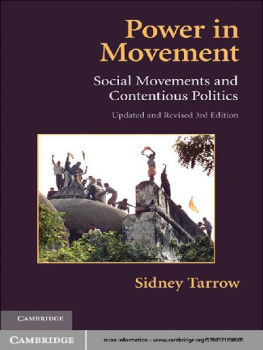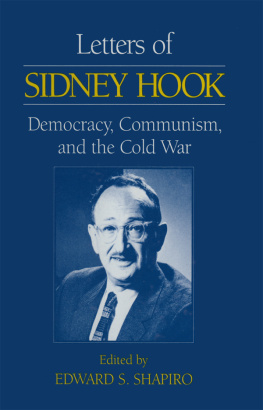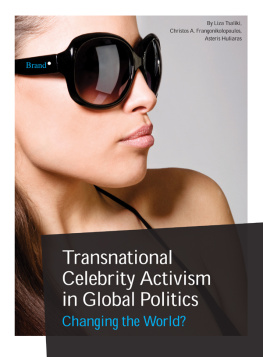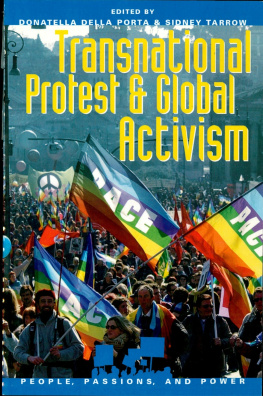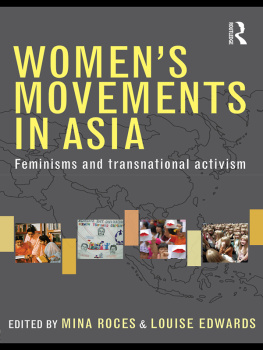Sidney Tarrow - The New Transnational Activism
Here you can read online Sidney Tarrow - The New Transnational Activism full text of the book (entire story) in english for free. Download pdf and epub, get meaning, cover and reviews about this ebook. year: 2005, publisher: Cambridge University Press, genre: Politics. Description of the work, (preface) as well as reviews are available. Best literature library LitArk.com created for fans of good reading and offers a wide selection of genres:
Romance novel
Science fiction
Adventure
Detective
Science
History
Home and family
Prose
Art
Politics
Computer
Non-fiction
Religion
Business
Children
Humor
Choose a favorite category and find really read worthwhile books. Enjoy immersion in the world of imagination, feel the emotions of the characters or learn something new for yourself, make an fascinating discovery.

- Book:The New Transnational Activism
- Author:
- Publisher:Cambridge University Press
- Genre:
- Year:2005
- Rating:3 / 5
- Favourites:Add to favourites
- Your mark:
- 60
- 1
- 2
- 3
- 4
- 5
The New Transnational Activism: summary, description and annotation
We offer to read an annotation, description, summary or preface (depends on what the author of the book "The New Transnational Activism" wrote himself). If you haven't found the necessary information about the book — write in the comments, we will try to find it.
The New Transnational Activism — read online for free the complete book (whole text) full work
Below is the text of the book, divided by pages. System saving the place of the last page read, allows you to conveniently read the book "The New Transnational Activism" online for free, without having to search again every time where you left off. Put a bookmark, and you can go to the page where you finished reading at any time.
Font size:
Interval:
Bookmark:
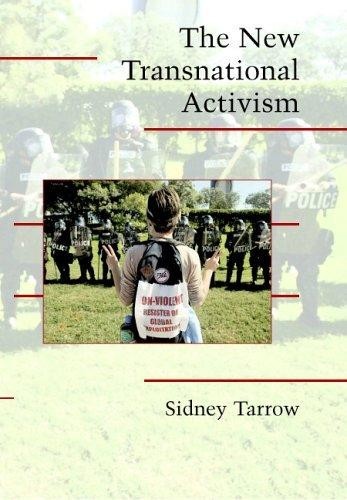
The global justice movement, anti-Iraq war protests, Al Qaeda, Eurostrikes, globalized ethnic diasporas, insider/outsider coalitions of local activists with international advocacy groups, transnational alliances and cross-border collaborations of the global human rights network, and the international diffusion of Truth and Reconciliation Commissions throughout the social sciences, many are now studying the actors, rela- tionships, forms, and strategies behind todays transnational activism.
Tarrow takes aim at these now extensive literatures on globalization and on transnational protest and he hits the bulls-eye. By offering the counterintuitive idea that transnational contentious politics still revolves around sovereign states their domestic structures and the international institutions they have created Tarrow makes a seminal contribution to this growing eld. Deploying a rich matrix of case materials, conceptual distinctions, and theoretical arguments, he brings such unmatched con- ceptual and substantive richness to so diverse a theoretical and empirical literature that everyone else is disappointing. I am tempted to say that he is the only one here really worth reading certainly the only one who will be read 20 years from now.
Jewish sages emphasized that there are four types of students: the sponge absorbs everything, the funnel passes everything, the strainer re- tains the sediment and lets the ne wine pass, and the sifter retains the wheat and lets the chaff pass. Tarrows strength is wisdom and judgment. He sifted through the growing literature on transnational activism, re- tained the important parts, and then erected a new political process theory of world politics. His approach to transnational contention rep- resents the next major theoretical challenge to the elds of international relations and comparative politics.
Mark Lichbach, University of Maryland
The New Transnational Activism

SIDNEY TARROW
Cornell University

CAMBRIDGE UNIVERSITY PRESS
Cambridge, New York, Melbourne, Madrid, Cape Town, Singapore, So Paulo
Cambridge University Press
The Edinburgh Building, Cambridge CB2 8RU, UK
Published in the United States of America by Cambridge University Press, New York www.cambridge.org
Information on this title: www.cambridge.org/9780521851305
First published in print format
2005
| ISBN-13 | 978-0-511-34895-2 | eBook (EBL) |
| ISBN-10 | 0-511-34895-9 | eBook (EBL) |
| ISBN-13 | 978-0-521-85130-5 | hardback |
| ISBN-10 | 0-521-85130-0 | hardback |
For Morris, Quiet Activist
From the battle of Seattle to the movement against the Iraq war, the extraordinary international protests of the late 1990s and the early years of the new century suggest that something is new on this planet of ours. We are witnessing, if not a full-blown global civil society or an integrated transnational polity, at least a trend toward new forms and new levels of transnational contention. It was to reconcile my growing sense that new actors are appearing with my belief that states remain the fundamental framework for contentious politics that I decided to write this book. It is dedicated to the task of identifying those actors, trying to understand their relationships, and charting their impact on domestic and international politics.
Those who have followed my work in the past may wonder that someone who linked social movements so closely to the modern national state would now see them in transnational terms. If the world has changed, social scientists must be prepared to understand it. Besides, the forms of transna- tional activism that I examine in this book do not oat above the earth but are shaped by states domestic structures and by the international institu- tions that they have created. Although it has been made before, I hope to specify this argument through attention to the processes that link the local with the global.
In my book I argue that the most effective transnational activists are rooted cosmopolitans people who grow up in and remain closely linked to domestic networks and opportunities. The converse is also true: if there are structural effects of transnational activism, they are found primarily in the transformation of domestic politics and society. Whether these trends are producing a fusion of domestic and international politics is the big question that lies at the heart of these issues. I turn to it at the end of the book.
I did not come to these views all at once or all on my own. With Doug Imig I began to examine transnational contention in Western Europe. In our project on European contention, we found nonstate actors reaching beyond their borders but employing domestic resources, networks, and opportu- nities to do so. I thank him and the other authors of Contentious Europeans (Rowman and Littleeld, 2001) for helping me to see the interaction of the national and the transnational in the emerging European polity.
Two major grants took me from my home turf in Western Europe to the broader eld of transnational contention: a grant from the National Science Foundation for research on transnational collective action,1 and a grant from the Ford Foundation for research on grass-roots activists and international institutions. I thank Lisa Jordan of the Ford Foundation for her condence that a social scientist whose roots were in Ithaca, New York, could understand the global problems she has dealt with as both an activist and foundation executive.
It was while I was a member of the contentious gang at the Center for Advanced Study in the Behavioral Sciences that the project advanced beyond its European origins. Shepherded by the gentle hand of Doug McAdam, watched over by the bemused eye of Bob Scott, and funded by the Mellon Foundation, Ron Aminzade, Jack Goldstone, McAdam, Elizabeth Perry, Charles Tilly, and I, along with a talented group of graduate fellows, explored new ways of examining contentious politics. Three collaborative books and the series Cambridge Studies in Contentious Politics emerged from that project. The center remains at the core of my intellectual debts, and my stints there are the source of my warmest memories of collegial collaboration.
If this book adds to our knowledge of transnational politics, it is in large part due to the help of colleagues whom I must thank as virtual col- laborators. They are Donatella della Porta, Peter J. Katzenstein, Robert
O. Keohane, Mark Lichbach, Doug McAdam, David S. Meyer, Kathryn Sikkink, Jackie Smith, and Charles Tilly. Lance Bennett, Valerie Bunce, Antonina Gentile, Mary Katzenstein, Margaret Levi, and Susan Tarrow also read every word some of them twice and I thank them for their col- legial devotion. I also received advice on international relations some of which I have even followed from Matthew Evangelista, Peter Gourevitch, and Hans Peter Schmitz and help from my friends David Laitin and Nicolas Sambanis. I thank them all for their patience and their advice. Many other colleagues read and commented on parts of the manuscript and are owed sincere thanks.
Font size:
Interval:
Bookmark:
Similar books «The New Transnational Activism»
Look at similar books to The New Transnational Activism. We have selected literature similar in name and meaning in the hope of providing readers with more options to find new, interesting, not yet read works.
Discussion, reviews of the book The New Transnational Activism and just readers' own opinions. Leave your comments, write what you think about the work, its meaning or the main characters. Specify what exactly you liked and what you didn't like, and why you think so.

